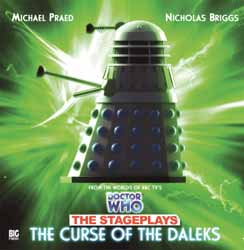|
Click here to return to the main site. Audio Drama Review
The spaceship Starfinder is taking two dangerous criminals for trial on Earth. En route, they hit a meteor storm and have to make an emergency landing on Skaro - the planet of the dreaded Daleks. Captain Redway and his faithful crew don’t anticipate any trouble. After all, the Daleks were defeated fifty years ago and now they are completely inactive. But when a crate full of mysterious devices is discovered and the Daleks start to come back to life, it becomes clear that there is a traitor amongst the Starfinder’s crew - a traitor who is intent upon reactivating the power of the Daleks... The Curse of the Daleks is the third and final adaptation in Big Finish’s Stageplays series, and the toughest one to remount. For one thing, the script is the oldest of the three and is very dated. Though written in 1965 (by former Doctor Who story editor David Whitaker and Dalek creator Terry Nation), the clipped dialogue sounds like it comes from an even earlier decade. As a reviewer for The Times put it: “though the period is the 21st century, the dialogue is initially strangely reminiscent of British war films with the upper lip being kept resolutely stiff.” Whitaker once again proves that he’s no scientist, as we are confidently informed that water won’t boil when travelling at the speed of light and that iron filings can wreck a space radio. People still use shillings. And then there’s the sexism! “About a year ago,” we are told, “girls were supposed to be gentle creatures, very much the weaker sex and happy to be so.” At least there’s an explanation of sorts for the latter anachronism: apparently, the notion of sexual equality is a “20th-century” idea that is now considered outmoded. A problem more pertinent to presenting this play on audio, as script editor / director / musician / sound designer / Dalek vocalist Nicholas Briggs explains in the behind-the-scenes extras, is that much of the play’s action, such as Daleks sneaking around in secret, takes place silently without the human characters being aware of it. In order to remain as faithful as possible to the stage script, Briggs opts to provide some moody narration as the authorial voice. Like Seven Keys to Doomsday, The Curse of the Daleks doesn’t really fit into Doctor Who continuity - but then Dalek history has always been problematic. Here the crew and passengers of the Starfinder discover an overgrown and inactive Dalek city, though apparently it wasn’t the Doctor and co who deactivated it (in The Daleks), but rather a party of Earth soldiers during some space war fifty years previously. Are we to assume that the inert Daleks were reactivated at some point between The Daleks and the war, only to be deactivated again? Is there more than one city? In its favour, the plot did provide inspiration for future television stories. Whitaker reworked the idea of Daleks pretending to be subservient while their power supply is being restored in The Power of the Daleks. A decade later, Nation echoed the creatures’ rejection of a humanoid master in Genesis of the Daleks. The Daleks here are as cunning and devious as they have ever been, in a whodunit that certainly kept me guessing. The overall tone is surprisingly adult, considering that the stage version was performed as a matinee. In terms of production, this audio presentation is a curious mixture of old and new. The atmospheric effects for the planet Skaro and the Dalek city are authentic sounds (or convincing re-creations thereof) from the original Dalek serial, whereas the whirring noises of the creatures moving around reflect their most recent appearances in the revived TV show. The moody (yes, I’ve used that word before, but it’s appropriate) theme tune combines elements from the signature tunes to Doctor Who and Big Finish’s Dalek Empire series. John Line, who played the enigmatic Ladiver in the original stage production, takes on the role of the inquisitive Professor Vanderlyn, while Michael Praed (Robin of Sherwood) inherits the character of Ladiver. Praed is superbly inscrutable, though I was distracted by how much he sounds like Paul McGann to my ears. Despite all the difficulties involved in bringing this play to audio in the 21st century (that’s the actual 21st century, not the fictitious one in which space travellers spend shillings and human colonists inhabit Mars and Venus) Briggs succeeds in overcoming the curse of The Curse of the Daleks. 7 Richard McGinlay |
|---|

